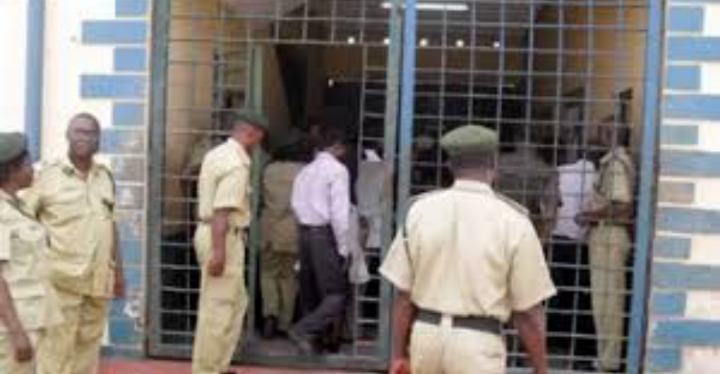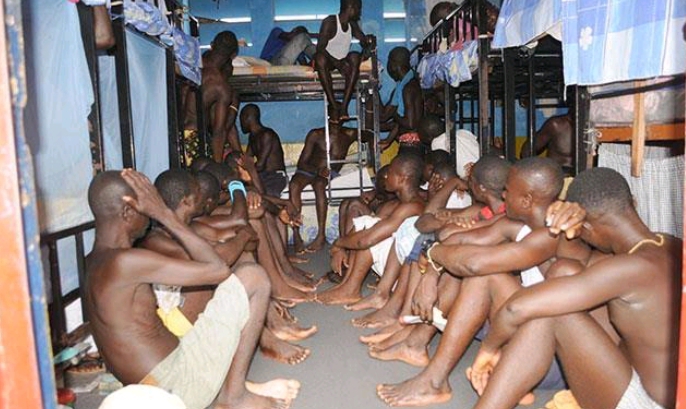In a society yearning for justice and the opportunity to rehabilitate and reintegrate the Ex-convicts back into society, the need for prison reform has never been more pressing. As we grapple with rising crime rates and the devastating consequences they bring, it becomes evident that the current approach of mixing offenders of different categories within the same prison walls only exacerbates the problem.
Separating low-level offenders from hardened criminals holds the key to breaking the vicious cycle of criminality. By taking bold action to reorganize our prisons, we can create an environment that fosters genuine rehabilitation, empowers convicts to transform their lives, and ultimately builds a safer and more harmonious society. Change is not just desirable but imperative for the well-being and future of our nation.
Let me walk you through the story of the indiscriminate mixing of various categories of offenders behind bars. Segun was a diligent motor mechanic, known for his meticulous work and dedication to his craft. He took pride in repairing vehicles and ensuring that his customers were satisfied. Unfortunately, one fateful day, a series of unfortunate events unfolded that would change his life forever.

A customer had entrusted Segun with his car, hoping he would fix the engine trouble that had been plaguing the car. Segun worked tirelessly, trying to diagnose the problem and find a solution. However, despite his best efforts the vehicle has to stay in the workshop till the following day. Sadly, the engine mysteriously disappeared while the car was under his care.
The customer, angry and desperate for justice, accused Segun of stealing the engine. The evidence was circumstantial, but it was enough for the court to convict him. Segun, a first-time offender, was sentenced to seven months in prison for a crime he didn’t commit.
Read Also: The Incursion of Political Merchants in Nigeria Politics
Inside the prison walls, Segun found himself in a grim and unforgiving environment. The correctional facility was overcrowded, housing both low-level criminals and hardened individuals who had committed heinous acts. Segun, with his lack of criminal knowledge, was like a lamb thrown into a den of wolves.
He longed for a chance to prove his innocence and return to the life he had lost. However, instead of finding support and guidance, Segun was forced to interact with individuals who had embraced a life of crime. These hardened criminals saw an opportunity in Segun, a vulnerable newcomer who could be easily manipulated.
As time went by, Segun became entangled in the web of criminal connections within the prison walls. He was introduced to a ruthless robbery gang, a group of individuals who saw his potential for their illicit activities. They exploited his worry, offering him a sense of belonging and protection within their ranks.
Segun succumbed to the allure of the gang. The once-diligent motor mechanic had now transformed into a notorious armed robber. His interactions with hardened criminals had tainted his innocence, and he was now a pawn in a game of violence and chaos.

After serving his term, Segun orchestrated numerous daring heists with the support of his newfound criminal network, brazenly targeting innocent people. The fear of his name spread like wildfire throughout the city, and his actions escalated to the point where he began killing policemen who stood in his way.
But just as his reign of terror reached its peak, fate intervened. Segun’s luck ran out, and he met his inevitable Waterloo. The same policemen he had mercilessly murdered closed in on him, finally bringing an end to his destructive spree.
The sorrowful tale of Segun serves as a stark reminder of the urgent need for prison reform. The current system, where low-level criminals and first offenders are indiscriminately mixed with hardened criminals, only breeds an environment of corruption and violence.
Read Also: Direct Taxes Deduction from Every Bank Transaction Can Boost Tax Revenue
Segun, a once-promising mechanic, was swallowed by a system that failed to recognize his potential for redemption. If there had been proper separation and focused rehabilitation programs in place, perhaps his story would have taken a different turn. Instead, society lost a productive member, and countless lives were shattered by his actions.
It is a sombre lesson that we must strive for change, pushing for a prison system that prioritizes the separation of low-level offenders from hardened criminals. By doing so, we can provide individuals like Segun with the opportunity to reform, rebuild their lives, and contribute positively to society. Let us not allow more innocent lives to be lost to the cruel cycle perpetuated by our current system.
Segun, once a diligent young man, possessed a glimmer of potential before his ill-fated prison experience. It is a stark reality that our current system, with its indiscriminate mixing of various categories of offenders, has transformed countless individuals like Segun into entirely different people. This profound issue calls for urgent and meaningful prison reform—a reform that prioritizes the separation of hardened criminals from those who have committed light offences.

Dumping offenders of different degrees of criminality into the same prison custody has proven to be a recipe for disaster. The environment within these walls breeds a toxic cycle of influence and corruption, where the misguided lead the vulnerable astray. Instead of providing a platform for rehabilitation and growth, our prisons have become breeding grounds for the transformation of light offenders into hardened criminals.
Segun’s story serves as a chilling example of this tragic reality. Before his imprisonment, he displayed signs of defiance and stubbornness, but his diligence in his mechanic’s work showcased a glimmer of potential. However, the system failed Segun and others like him. By throwing them into an environment that lacked the necessary distinctions between low-level and high-risk offenders, we allowed their negative traits to flourish, transforming them into individuals detached from their original identities.
To bring about change, we must advocate for a prison system that places a strong emphasis on separating hardened criminals from those who have committed light offences. This separation will help create an environment that is conducive to rehabilitation and reformation. By doing so, we can ensure that individuals like Segun are not consumed by the negative influences prevalent among more serious offenders.
Read Also: Transform Nigerian Local Councils into Agric Development Centres to Enhance Productivity
Moreover, the reform we seek goes beyond mere physical separation. It entails the implementation of tailored programs that address the specific needs of different categories of offenders. Light offenders should have access to educational programs, vocational training, and counselling that can guide them towards a path of redemption. By providing them with the necessary tools for personal growth, we can empower them to become productive members of society once they have served their time.
On the other hand, hardened criminals require specialized interventions that focus on breaking the cycle of violence and criminal behaviour. Programs that target cognitive restructuring, and emotional rehabilitation can help address the root causes of their actions, paving the way for their successful reintegration into society. Such interventions are best delivered in environments separate from those inhabited by light offenders.
The importance of prison reform cannot be overstated. By creating a system that effectively separates low-level offenders from hardened criminals, we can break the cycle of influence that transforms individuals like Segun into threats to society. We have a moral obligation to provide a pathway for redemption, offering hope for a better future.

To effectively address the rising number of criminals in our society, we must reorganize our prison system into different categories, carefully separating offenders based on the severity of their crimes. The current practice of dumping individuals from various categories together in the same cells has only perpetuated the cycle of criminality. By implementing a comprehensive categorization system, we can create an environment that promotes rehabilitation and minimizes the negative influence of hardened criminals.
The high offence category should be reserved for individuals who have committed heinous crimes such as intentional murder, robbery, and kidnapping. These offenders pose a significant threat to society and require a secure and controlled environment. By separating them from other categories, we can mitigate the risks they pose to individuals who have committed lesser offences.
The middle offence category should encompass individuals who have engaged in crimes such as theft, white-collar offences, unintentional murder, arson, drug-related offences, and smuggling. These offenders represent a diverse range of criminal activities, but they do not necessarily exhibit the same level of violence or danger as those in the high offence category. By grouping them, we can tailor rehabilitation programs to address the specific needs and risks associated with their offences.
Read Also: The HND-BSc Dichotomy Debate: Unveiling the Consequences.
The low offence category should house individuals who have committed crimes such as rape, stealing, fraud, assault, malicious damage, contempt of court, and similar offences. While their actions are still criminal, they generally do not pose as grave a threat to society as those in the higher categories. By separating them from more serious offenders, we can create an environment conducive to their rehabilitation and reintegration into society.
Implementing this categorization system will enable us to create targeted rehabilitation programs that address the specific needs of each category. High offence offenders may require intensive therapy, counselling, and interventions to address their violent tendencies. Middle offence offenders may benefit from educational programs, vocational training, and substance abuse treatment. Low offence offenders may benefit from anger management courses, life skills training, and social reintegration programs.
By separating these categories, we can prevent the mingling of offenders who may influence and corrupt one another. Furthermore, categorization also allows for more efficient resource allocation. By separating offenders based on the severity of their crimes, prison staff can better allocate resources, personnel, and security measures to ensure the safety and well-being of all inmates. Staff members can also provide appropriate levels of supervision and guidance tailored to the needs of each category, increasing the effectiveness of rehabilitation efforts.

Reorganizing our prison system into different categories is not about endorsing or excusing criminal behavior, nor about treating offenders leniently or dismissing the seriousness of their crimes. It is about adopting a pragmatic and evidence-based approach that acknowledges the complexities of criminal behavior and seeks to reduce the likelihood of reoffending. It is about creating an environment that maximizes the potential for rehabilitation and ultimately contributes to the safety and well-being of our society.
The reorganization of our prisons into distinct categories is a crucial step in addressing the increasing number of criminals in our society. By separating offenders based on the severity of their crimes, we can create an environment that promotes rehabilitation and prevents the negative influence of hardened criminals on others. This necessary reform will ensure that our prisons become places of redemption and growth, and ultimately contribute to a safer and more harmonious society.
Reorganizing our prison system into different categories to separate offenders based on the severity of their crimes is not just a matter of practicality, but one rooted in evidence-based practices and the goal of reducing recidivism rates. Research has consistently shown that mingling different categories of offenders together in the same facilities can have detrimental effects, leading to increased criminality and a higher risk of reoffending. By creating an environment that minimizes negative influences, we can ultimately reduce the number of individuals returning to a life of crime upon release.
Read Also: 2023 Population Census: A Necessity for Addressing Nigeria’s Problems
One of the primary reasons for categorizing offenders is to prevent the influence of hardened criminals on those who have committed lesser offences. Prisons are a microcosm of society, and just as negative influences can shape individuals in the outside world, they can also have a profound impact within the confines of prison walls. When low-level offenders are exposed to hardened criminals, they may become more likely to adopt their behavior, attitudes, and values, perpetuating a cycle of criminality.
Separating high offence, middle offence, and low offence categories helps to minimize this negative influence. Hardened criminals, who often have extensive experience in criminal activities and may exhibit a lack of remorse or empathy, can be isolated from those who are more susceptible to their influence. By doing so, we create an environment that promotes positive change and reduces the risk of low-level offenders escalating to more serious crimes.
Moreover, the categorization of offenders enables a more focused approach to rehabilitation. Different categories of offenders often have distinct needs, risks, and underlying factors contributing to their criminal behavior. By grouping them into different categories, we can tailor rehabilitation programs to address these specific needs and provide targeted interventions.

For high offence offenders, who may have a history of violence and pose a significant risk to public safety, intensive therapeutic interventions aimed at addressing their aggressive tendencies and promoting empathy can be implemented. Rehabilitation programs for middle offence offenders may focus on addressing substance abuse issues, providing vocational training, and imparting skills that increase their employability upon release. Low offence offenders may benefit from programs focused on anger management, decision-making, and reintegration into society.
In conclusion, reorganizing our prison system into different categories is a logical and informed approach to promote rehabilitation, reduce recidivism, and enhance public safety. By separating offenders based on the severity of their crimes, we create an environment that limits the influence of hardened criminals, allows for targeted rehabilitation programs, and optimizes resource allocation. Let us embrace this necessary reform, rooted in empirical evidence, to foster positive change and contribute to a safer and more resilient society.
In the face of mounting challenges within our criminal justice system, there is an urgent need to address the critical issue of categorizing offenders in our prisons. It is no longer acceptable to allow individuals of different degrees of criminality to be confined together, fostering an environment that perpetuates the cycle of crime. Separating hardened criminals from low-level offenders, and creating a system that prioritizes rehabilitation and reduces the risk of reoffending is imperative to pave the way for a safer and more just society.
Idowu E. Faleye, a certified Data Analyst, Political Activist, and writer, is a graduate of Politics & Public Administration. He’s the Founder/Chief Data Officer at EphraimHill Data Blog –a Data Reporting Site that is niche in Politics & Society. He can be reached at +2348132100608. or ephraimhill01@gmail.com










































![The Trend of Insecurity in Nigeria. [Part 2]](https://ephraimhilldc.com/wp-content/uploads/2024/09/Computer-Monitoring-of-Remote-areas.png)


































